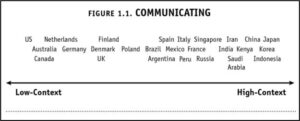Communication and Cultural Intelligence in the Workplace
By Vaishnavi Mansabdar, Industry and Campus Partnerships Specialist

Developing cultural intelligence (CQ) is a critical skill for international students navigating the workplace. Cultural intelligence is defined as the ability to understand, appreciate, and effectively navigate different cultural contexts. It entails self-reflection, recognizing and appreciating cultural differences, and demonstrating empathy by putting ourselves in other people’s shoes. This involves self-awareness of our own cultural assumptions, adapting to various situations, and communicating effectively with individuals from diverse backgrounds. As a public health professional, I’ve realized the importance of enhancing my cultural intelligence to adapt and understand various cultural contexts.
Communication with cultural Intelligence perspective:
According to Erin Meyer, author of “The Culture Map,” cultures can be divided into two types of contexts: high-context and low-context (Meyer, 2023). In high-context cultures, such as most Asian countries, much of the meaning of a conversation is conveyed through nonverbal cues, such as tone of voice, facial expressions, and body language. These cultures tend to place a higher value on building relationships and trust, and communication is often more indirect. In contrast, low-context cultures, such as the United States, rely more on explicit communication and directness to convey meaning. In these cultures, building relationships and trust may be less important than getting to the point quickly and efficiently.
When communicating in diverse cultural contexts, it is essential to recognize that different cultures have distinct communication styles. For instance, when communicating via email, it is critical to state the issue or purpose of the email clearly in the opening statement. Consider a scenario where a student needs to communicate with their supervisor to seek clarification on an assignment they have been graded on. In this situation, the email should include the following:
- The assignment details.
- The student’s original approach towards the assignment in a concise manner.
- Request for specific ways to improve.
Clear and concise communication is vital to ensure the reader can navigate the requirements effectively and provide an appropriate response. Given that almost all professional and formal communication occurs via email, it is crucial to express your concerns effectively and concisely, rather than through a lengthy story or essay. If the situation requires further elaboration, an in-person or virtual meeting may be requested.
As an international student, developing cultural awareness and practicing appropriate communication styles with mentors and peers has been crucial for effectively navigating diverse workspaces. A key lesson that resonated with me was imparted by one of my mentors, who emphasized the absence of universal cultural norms and instead highlighted the importance of adaptability and continuous learning in engaging with different cultures. This notion reinforces the idea that cultural engagement is not about right or wrong behaviors, but rather about the willingness to learn, adapt, and consciously improve in order to effectively engage with diverse cultural contexts. By embracing this mindset, international students can become better equipped to successfully navigate cross-cultural interactions in academic and professional settings.
Developing cultural intelligence is an ongoing process that requires time, effort, and commitment. As someone with a passion for public health, education, and community engagement, I believe that it is essential for achieving professional success in today’s global marketplace. By actively reflecting on my own cultural assumptions, practicing empathy, and cultivating curiosity, I am committed to developing the cultural intelligence necessary to navigate differences in the workplace successfully.

The Culture Map (Meyer, 2023)
Share